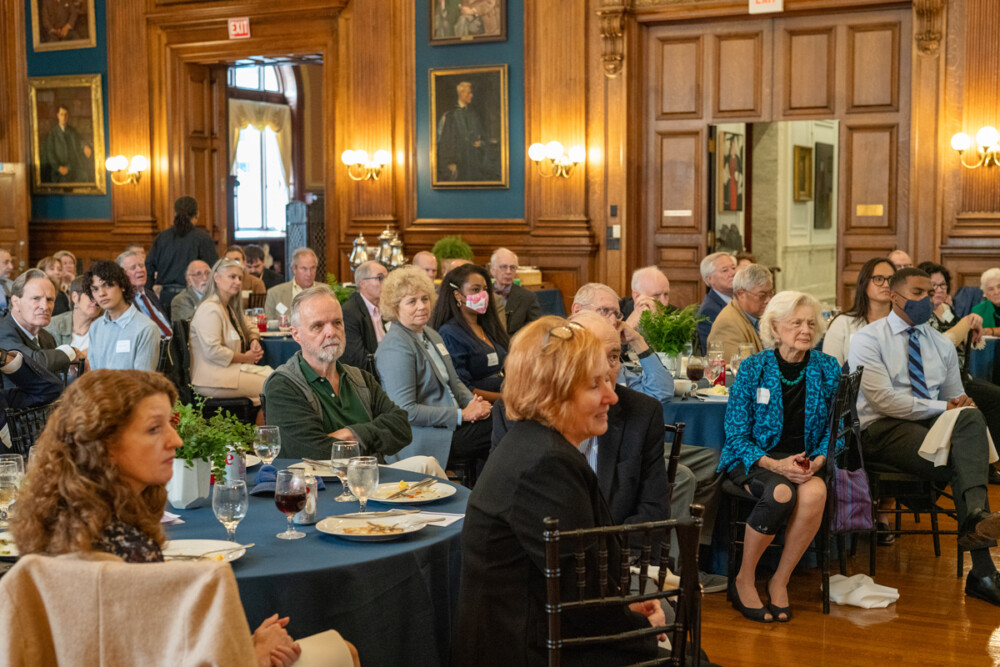
How PA’s Environmental Rights Amendment could challenge PGW to consider climate
Pennsylvania is one of six states to include environmental protections in its Constitution. As a tool used before, it could help Climate Advocates in Philadelphia.
Through the doors of Philly’s curious Mütter Museum and up its sprawling marble staircase awaits a large, sunlit banquet hall with aging paintings dotting its dark walls. Recently, the portraits in the Mitchell Room surrounded Pennsylvania climate advocates invited by the Pennsylvania Bipartisan Climate Initiative. The crowd was there to elevate nonpartisan efforts in support of a powerful climate tool: Pennsylvania’s Environmental Rights Amendment.
Pennsylvania’s Climate Shield and Sword
Pennsylvania’s Environmental Rights Amendment (ERA) is a clause in the Commonwealth’s Constitution that defends Pennsylvanians’ right to a healthy environment. Pennsylvania is one of only six states to express environmental protections directly in its constitution. It was ratified in the 1970s, but only within the recent decade has seen a resurgence of attention in court.
The ERA (Article I, Section 27) states:
The people have a right to clean air, pure water, and to the preservation of the natural, scenic, historic and esthetic values of the environment. Pennsylvania’s public natural resources are the common property of all the people, including generations yet to come. As trustee of these resources, the Commonwealth shall conserve and maintain them for the benefit of all the people.
In the landmark 2013 case of Robinson Township v. Commonwealth of Pennsylvania, Chief Justice Ron Castille used the ERA to assert that several parts of Pennsylvania’s “Act 13” – a statute which would have allowed “the exploitation and recovery of natural gas in a geological formation known as the Marcellus Shale” – were unconstitutional.
Castille’s plurality opinion proved seminal. Since Robinson, climate advocates have leveraged the ERA’s language to protect and act for the state’s natural resources across party lines.
Joe Khan is a partner at Curtin & Heefner LLP, litigators of the Robinson case. Khan pushes for climate action to take care of future generations, like his own children. At Tuesday’s Climate Initiative briefing, Khan described the ERA as both a “shield and a sword” for climate cases.
As a shield, abiding by the language of the ERA by protecting land and safeguarding clean water equates to less vulnerability to litigation, according to Khan.
“But it’s not just about playing defense,” he added. The ERA can be used as an offensive sword to cut through proposed measures that do not align with its language. Commonwealth officials have a “duty as trustees” and must “act in accordance with that duty.” In this way, the ERA can proactively care for land, water, and air despite political ties.
“If climate change remains political, it will be extremely challenging to make the changes we need to make,” said Michael Sklaroff, Executive Director of the Pennsylvania Bipartisan Climate Initiative.
Sklaroff timed his statement well. The state Senate recently reportedly voted along party lines to repeal the state’s involvement in RGGI’s CO2 budget trading programs. The bill now waits in the state House of Representatives Committee of Environmental Resources and Energy.
The question remains if using a tool like the ERA could prove effective in this case.
Local Case Study: How POWER Interfaith wants PGW to consider Climate
Utilizing the ERA isn’t without its obstacles.
POWER Interfaith, a faith-based social justice coalition, has been so effective in navigating the law that the Philadelphia Gas Commission wants to ban it from participating in its budget proceedings for Philadelphia Gas Works.
Represented by Devin McDougall at Earthjustice, POWER discovered during the Gas Commission’s 2022 budget meeting for the 2023 fiscal year that PGW intended to both increase rates for PGW customers and use some of that revenue to continue the replacement of natural gas infrastructure.
“PGW planned to keep funding the development of natural gas pipelines until 2050,” explained McDougall. This plan would have undermined the city’s goal of achieving carbon neutrality by 2050. PGW contributes almost one-fifth of Philly’s carbon emissions, and the Office of Sustainability released a PGW Diversification Study in December 2021.
“We found no climate planning from PGW,” said McDougall.
POWER took the matter to the Pennsylvania Public Utility Commission which oversees regulations for PGW. While the Commonwealth’s Public Utility code does not explicitly require the Public Utility Commission to consider climate change, the ERA requires all Commonwealth agencies – as trustees – to consider climate change. In light of this, POWER argued that PGW should be required to systematically analyze non-pipeline alternatives to shift away from fossil fuels.
PGW argued that the Utility Commission does not have jurisdiction over the matter. As it is the Utility Commission’s job to oversee state regulations, the Commission ruled that it did, indeed, have jurisdiction, setting the precedent for future cases.
Just under one year later, POWER’s Climate Justice Director Julie Greenberg stood at the Climate Initiative’s podium to ask the room for support at an upcoming hearing with the Philadelphia Gas Commission. The public hearing – which is still unscheduled – will be in regards to the Commission’s proposal to ban community groups like POWER from budget proceedings.
“Many people who oppose the regulation to ban community groups will make comments at the hearing,” wrote Greenberg in an email following the event. PGW is a municipal utility that is required to invite public participation before passing such proposals.
Stay up to date here with the RGGI case and POWER’s hearing.
Photos: Media by Moya for the Pennsylvania Bipartisan Climate Initiative






